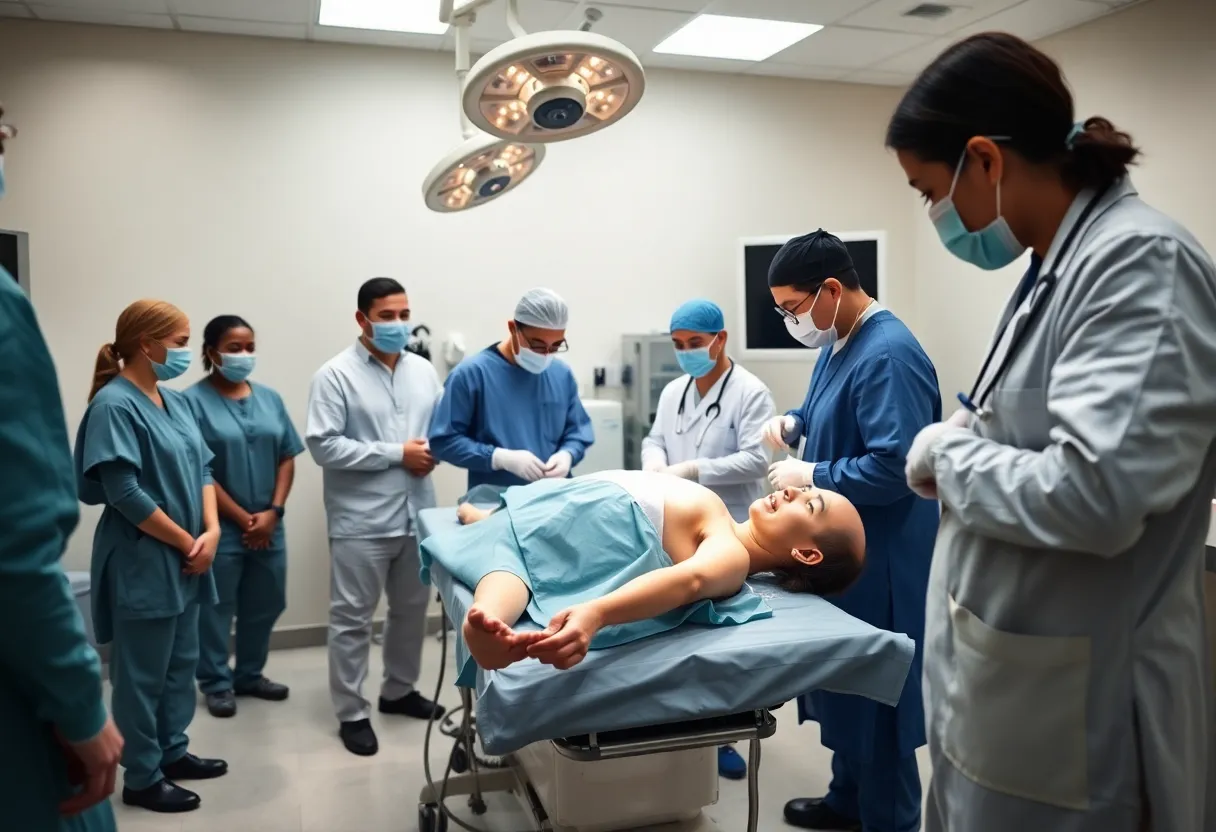News Summary
The University of Southern California faces ethical concerns after it was revealed that human cadavers purchased by the U.S. Navy are being used for Israeli Defense Forces’ trauma training. Over $860,000 has been spent on cadavers for this purpose, sparking debates over consent and ethical management of remains. While USC insists they follow regulations, medical professionals argue about the implications of using unclaimed bodies in military contexts. This situation raises significant questions about transparency and dignity in posthumous treatment as USC continues its collaboration with the Navy.
Los Angeles – A contract between the University of Southern California (USC) and the United States Navy has raised ethical concerns after it was revealed that human cadavers purchased by the Navy are being used for trauma surgery training for the Israeli Defense Forces (IDF). The Navy has reportedly spent over $860,000 on at least 89 “fresh cadaver bodies” from USC, with 32 specifically allocated for training IDF surgical teams at the Los Angeles General Medical Center.
The relationships between USC and the Navy, which extend over a century, have come under scrutiny following these revelations. An additional contract remains active, which could contribute up to $225,000 more to the total revenue from such contracts, potentially bringing USC’s earnings from these agreements to approximately $1.1 million over the last seven years. Notably, these cadaver contracts represent less than 1% of USC’s total 367 contracts with the Navy.
Medical professionals have raised significant concerns about whether families of the deceased were adequately informed about how their loved ones’ bodies would be used. Ethical issues arise particularly because many cadavers are believed to be sourced from unclaimed bodies, which cannot provide informed consent. While allegations point towards a lack of transparency, USC insists that it adheres to all applicable regulations regarding cadaver acquisition and usage.
The trauma training conducted at the Navy Trauma Training Center (NTTC) in Los Angeles enables IDF surgical teams to develop crucial skills for battlefield injuries. This intensive training involves both perfused cadaver bodies, treated with artificial blood to simulate live patients, and non-perfused bodies. A 2020 medical study highlighted the use of fresh human cadavers in training for IDF personnel, emphasizing the need for such resources to replicate real-life trauma scenarios effectively.
The bodies used in these training exercises primarily come through the L.A. County Office of Decedent Affairs, which manages unclaimed bodies. Families may refrain from claiming a body for various reasons, including financial constraints associated with burial. Experts emphasize that deceased individuals deserve dignified treatment even after death, raising questions about the ethical management of their remains.
Evidently, most medical schools typically operate under a “blanket consent” framework for body donations, although regulations governing this process differ from state to state. The Keck School of Medicine, responsible for the cadaver acquisition process, affirms that it operates within established legal frameworks. California law permits the employment of unclaimed bodies for research and educational purposes, but concerns linger regarding the lack of explicit consent for their use in military training situations.
A medical professional associated with the Keck School pointed out that the facility’s primary purpose is to train personnel to handle trauma situations rather than to save lives. Meanwhile, dissent from within USC’s medical students has surfaced, with some expressing strong ethical objections against the contracts with the Navy and the IDF.
While the partnership between L.A. General Medical Center and the Navy has led to the development of essential trauma training programs, officials clarified that the programs funded by the Navy do not involve training foreign nationals directly. The Fresh Tissue Dissection Laboratory, funded collaboratively, serves the training needs of both USC and L.A. General’s residency programs.
In addition to the IDF contracts, international medical personnel, including medical staff from Israel, have participated in trauma training courses conducted by the Navy since 2013, aimed at ensuring readiness for critical medical care in trauma situations. Each course involving IDF personnel covers the costs of using cadavers alongside necessary resources such as lab staff, medical supplies, and perfusion services. The contracts concerning IDF training can potentially be extended until September 2026, indicating ongoing military-civilian collaboration.
The current situation underscores a complex interplay of ethical considerations, regulatory frameworks, and the urgent need for trauma training resources in military settings. The University of Southern California continues to emphasize its commitment to medical advancement while navigating the complicated realm of cadaver use in military education.
Deeper Dive: News & Info About This Topic
HERE Resources
Additional Resources
- USC Annenberg Media: USC Sold Dead Bodies to US Military
- Wikipedia: Medical Ethics
- USC Annenberg Media: Ethical Concerns Surrounding USC-Navy Contracts
- Google Search: Trauma Surgery Training
- USC Annenberg Media: The Controversy of Cadaver Use in Medical Training
Author: STAFF HERE LOS ANGELES WRITER
The LOS ANGELES STAFF WRITER represents the experienced team at HERELosAngeles.com, your go-to source for actionable local news and information in Los Angeles, Los Angeles County, and beyond, specializing in "news you can use" with coverage of product reviews for personal and business needs, local business directories, politics, real estate trends, neighborhood insights, and state news affecting the area—with deep expertise from years of dedicated reporting and strong community input, including local press releases and business updates, while delivering top reporting on high-value events like the Academy Awards, LA Auto Show, and Los Angeles Marathon, extending coverage to key organizations such as the Los Angeles Area Chamber of Commerce and the Los Angeles Tourism & Convention Board, plus leading businesses in entertainment and technology like Warner Bros. and SpaceX, and as part of the broader HERE network including HEREAnaheim.com , HERECostaMesa.com , HEREHuntingtonBeach.com , and HERESantaAna.com , providing comprehensive, credible insights into Southern California's dynamic landscape. HERE Anaheim HERE Beverly Hills HERE Coronado HERE Costa Mesa HERE Hollywood HERE Huntington Beach HERE Long Beach HERE Los Angeles HERE Mission Viejo HERE San Diego HERE Santa Ana





